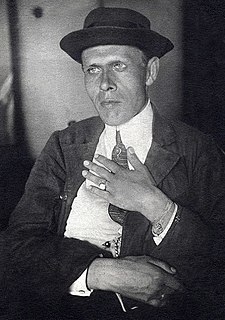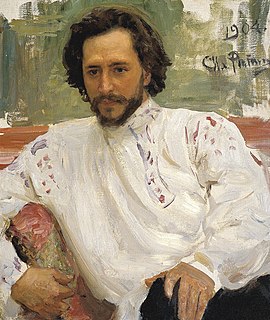A Quote by Richard Wagner
What a wonderful work Wagner has done for humanity in translating the toil of life into the readable script of music! For those who seek the tale of other worlds his magic is silent; but earth-travail under his wand becomes instinct with rhythmic song to an accompaniment of the elements, and the blare and crash of the bottomless pit itself.
Related Quotes
Is there anything on earth which would have meaning and would even change the course of events not only on earth, but in other worlds?” I asked my teacher. “There is,” my teacher answered me. “Well, what is it?” I asked. “It’s...” began my teacher and suddenly fell silent. I stood and waited intently for his answer. But he was silent. And I stood and was silent. And he was silent. And I stood, silent. And he was silent. We’re both standing and silent. Ho-la-la! We’re both standing and silent. Ho-le-le! Yes, yes, we’re both standing and silent! 16-17 July 1937
Christ used the flesh and blood of Mary for his life on earth, the Word of love was uttered in her heartbeat. Christ used his own body to utter his love on earth; his perfectly real body, with bone and sinew and blood and tears; Christ uses our bodies to express his love on earth, our humanity. A Christian life is a sacramental life, it is not a life lived only in the mind, only by the soul... Our humanity is the substance of the sacramental life of Christ in us, like the wheat for the host, like the grape for the chalice.
We have to focus on his early work, and just one or two of his movies, and elements of his TV shows, to keep his memory pure. People now know that Elvis could play a mean rhythm guitar himself, and needed no other musicians to perform a great song. But Elvis was not just a rock star, he was an all-round entertainer.
We are on the cusp of the emergence of a company of hidden men and women who with all faith and patience have been enduring great struggles and dealings, being processed by the Lord and filling up what is lacking in the afflictions of Christ. These are not those who seek a reputation for themselves, their passion is His glory and giving Him the church He has longed for. May God grant us all the heart of apostolic fathering and mothering that can release His power in the earth. Zion is once again in travail to bring forth her children.
Be assured that every man's success is in proportion to his average ability. The meadow flowers spring and bloom where the watersannually deposit their slime, not where they reach in some freshet only. A man is not his hope, nor his despair, nor yet his past deed. We know not yet what we have done, still less what we are doing. Wait till evening, and other parts of our day's work will shine than we had thought at noon, and we shall discover the real purport of our toil. As when the farmer has reached the end of the furrow and looks back, he can tell best where the pressed earth shines most.
Despite the amount of suffering, pain, misery, sorrow and travail which can exist in life, the reason for existence is the same reason as one has to play a game-interest, contest, activity and possession. The truth of this assertion is established by an observation of the elements of games and then applying these elements to life itself.
The marriage tie becomes possessed of a history and takes to itself traditions. This history and these traditions form a great fund, to which changing conditions and growing imagination constantly add. And the traditions, more especially, bear heavily upon the individual, overmastering his natural expression of the love instinct and forcing him to an artificial expression of that love instinct. He loves, not as his savage forbears loved, but as his group loves.
Let me offer you, metaphorically, two magic wands that have sweeping powers to change society. With one wand you could wipe out all racism and discrimination from the hearts and minds of white America. The other wand you could wave across the ghettoes and barrios of America and infuse the inhabitants with Japanese or Jewish values, respect for learning, and ambition. ... I suggest that the best wand for society and for those who live in the ghettoes and barrios would be the second wand.
In all His acts God orders all things, whether good or evil, for the good of those who know Him and seek Him and who strive to bring their own freedom under obedience to His divine purpose. All that is done by the will of God in secret is done for His glory and for the good of those whom He has chosen to share in His glory.
Born, the Man assumes the name and image of humanity, and becomes in all things like unto other men who dwell upon the earth. Their hard lot becomes his, and his, in turn, becomes the lot of all who shall come after him. Drawn on inexorably by time, it is not given him to see the next rung on which his faltering foot shall fall. Bounded in knowledge, it is not given him to foretell what each succeeding hour, what each succeeding minute, shall have in store for him. In blind nescience, in an agony of foreboding, in a whirl of hopes and fears, he completes the cycle of an iron destiny.
Productiveness is your acceptance of morality, your recognition of the fact that you choose to live-that productive work is the process by which man's consciousness controls his existence, a constant process of acquiring knowledge and shaping matter to fit one's purpose, of translating an idea into physical form, of remaking the earth in the image of one's values-that all work is creative work if done by a thinking mind.
I urge pupils when studying a work and in order to master its most important aspic, the rhythmic structure, or the ordering of the time process, to do just what a conductor does with the score: to place music on the desk and to conduct the work from beginning to end as if it were played by someone else, an imaginary pianist with the conductor trying to impress him with his will, his tempo first of all, plus all the details of his performance.









































